


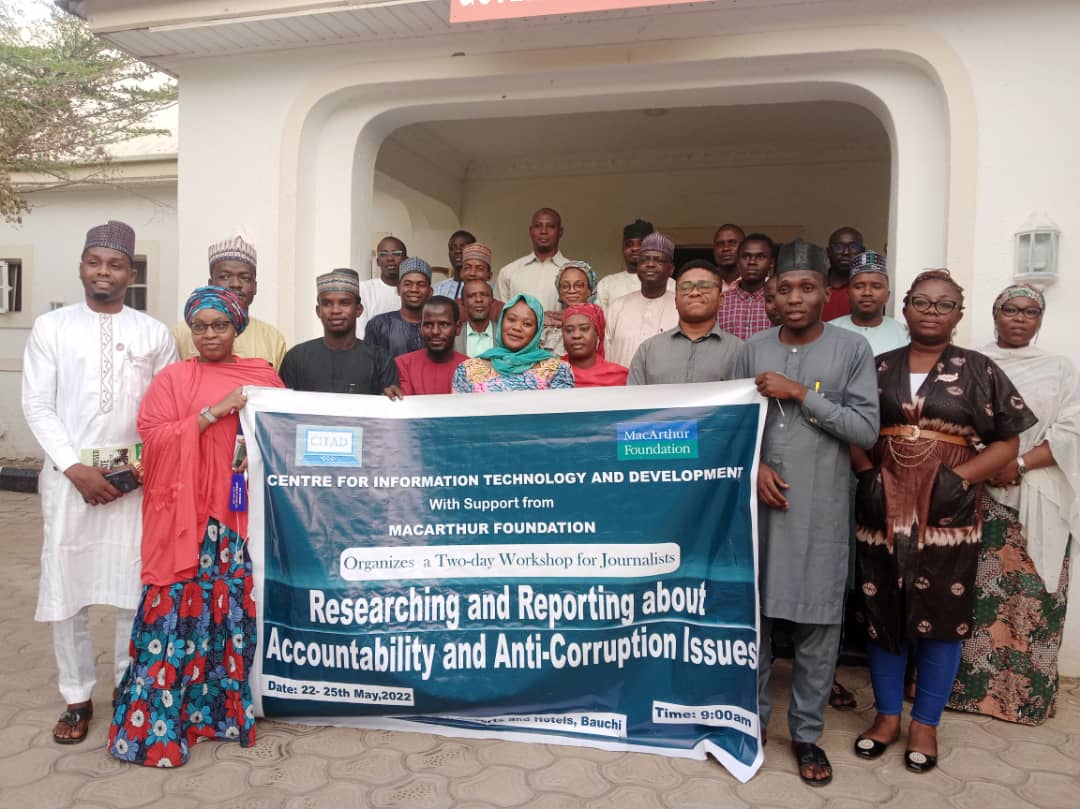
Center for Information Technology and Development (CITAD) has organized a two day workshop to some journalists that work in different media outlets on compiling reports on corrupt practices, investigative report and other multimedia skills.
The two-day workshop held on Monday 23 – Tuesday 24 of May, 2022 at Pali Suit in Bauchi state, was orchestrated to change the narration on the current issues of alleged corrupt practices by some public office holders in Nigeria, through investigative journalism.
Addressing the participants, the Director of CITAD, who spoke on the effects of fake news and how it can be dealt with, said the workshop will equip and encourage journalists on developing story ideas on human angle and general development journalism.
He explained that with the emergence of social media, the entire world has become a global village where people can easily showcase their talents in exposing the truth about any hazy event, through the use of social platforms.
Mr Buhari Abba, the moderator of the sessions, urged the participants to make the training workable and use the knowledge they have gotten to develop good stories on corruption at all levels.
The workshop mainly revolved around “researching and reporting about accountability and anti-corruption issues” in Nigeria.

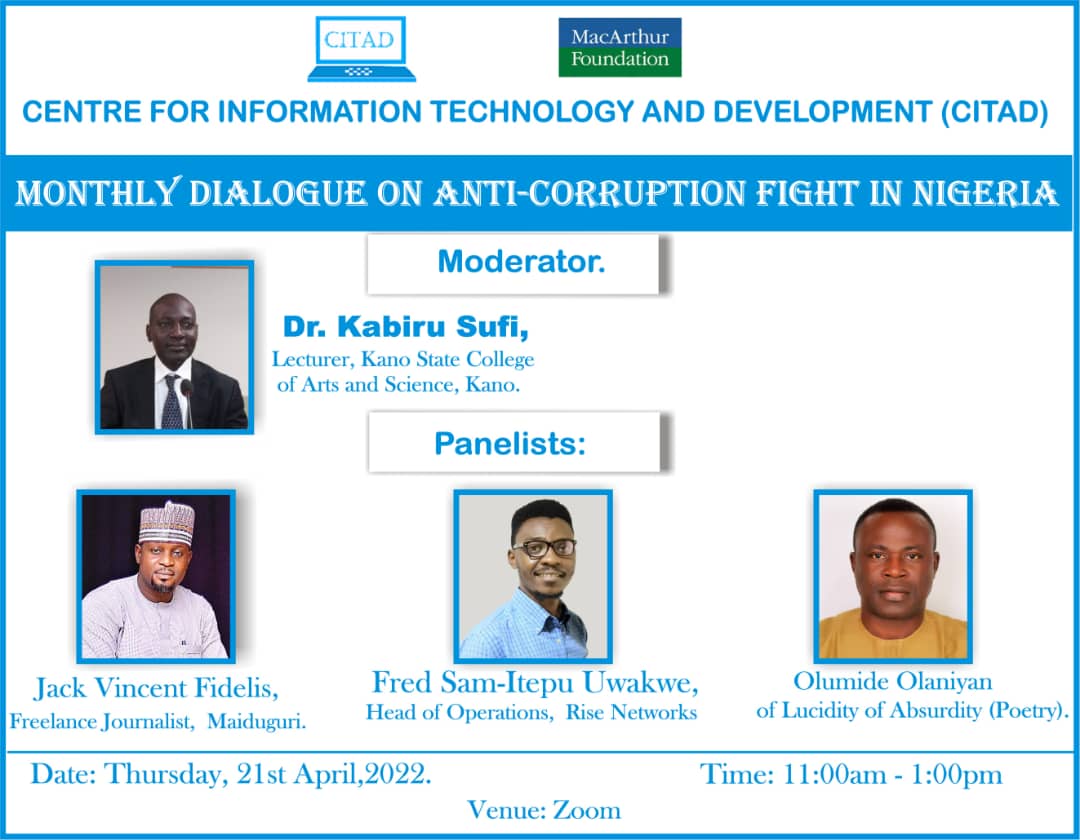
The Centre for Information Technology and Development had on 21st of April, 2022 under its project on Mobilizing and Catalyzing Citizens Action for Accountable Election and Governance in Nigeria supported by MacArthur Foundation held its Fourth Dialogue on Anti-Corruption Fight in Nigeria with another three set of its sub-grantees; Jack Fidelis Vincent, Independ Journalist based in Maiduguri, Olumide Olaniyan of Lucidity of Absurdity (Poetry) and Fred Sam-Itepu, Head of Operation, Rise Networks while Dr. Kabiru Sufi Sa’id, Principal Lecturer, Kano State College of Education and Preliminary Studies chaired the Dialogue. As it has become tradition in the Centre that every month it’s conducting the dialogue, in the month of March, the Centre hosted Danlami Nmodu, mni, Publisher NewsDiary Online, Bikiya Graham-Douglas, Executive Director, Beeta Network and Dr. Tunde Akanni, Lecturer at the Department of Mass Communication, Lagos State University with Clement Adebayo as the moderator
The dialogue started with an opening remarks by the Executive Director of CITAD, Engineer Yunusa Zakari Ya’u. Engineer Ya’u begin his remarks with aim of organizing the monthly dialogue where his stated that; the aim of the dialogue is to give the sub-grantees under this project an opportunity to regularly share their work with a wider audience in promoting accountability and fighting corruption in Nigeria. He also mentioned that the dialogue is aimed at giving both the sub-grantees and young people who have interest in the area an opportunity to discuss and share ideas. Engineer Ya’u went further to state that CITAD has for many years been working in the area of accountability and fighting corruption in Nigeria and empowering young people to demand for good governance. Buttressing further on the essence of organizing the monthly dialogue, the Executive Director said is to create a platform for the sub-grantees and those who have an interest in the area to discuss ideas and learn from each other as corruption and lack of accountability are the major obstacles towards the country’s growth and development”.
Moreover, Malam Ya’u lamented on the set back fighting corruption is recording in the country where he gave an example with presidential pardon granted to two convicted former governors of Plateau and Benue States after being tried and found guilty of stealing public funds while serving as governors in their states. At the end he urge the participants not relent on their efforts in the fight against corruption as it takes time to rid corruption out of the society.
Speaking on the different tools and mediums he utilizes in demanding for accountability and fighting corruption, Mr. Jack Vincent said in Maiduguri he used to organized small round table meetings to hear the opinions of people on how they perceive corruption and the best way to tackle it, from the opinions gather, he organizes radio programs including phone in where people call to give their own contributions and air their grievances. Also, Mr. Vincent used to do Vox Fox where he sample the opinions of the public on how corruption and bad governance is affecting their lives. Other activities conducted by this sub-grantee include documentaries. In the documentaries, Mr. Fidelis focuses more on capital projects that are poorly executed such as hospitals, roads, schools etc. in the state. This, he said they aired on their live radio program and also share on social media platforms such as Facebook and Twitter.
On his part, Mr. Olumide said their work is targeting at people at grassroots where they are enlightening them about the effect of corruption through the use of poetry. He said what they normally do is to ask people questions on the post elections issues like what their representatives are doing to better their lives. Also, Mr. Olaniyan said they organize mobile dramas where they went to local markets in Abuja in collaboration with markets officials and perform dramas on corruption. In the drama, Mr. Olaniyan said they are using four languages such as Hausa, Igbo, Yoruba and Pidgin English. Another tactic they explore is reading poems to community people on anti-corruption and accountability. In this case, he said they allow the community people to read the poems themselves in order to internalize and make the fight against corruption a habit. At the end he stated that they are sharing the messages to larger audiences using social media platforms like Facebook to popularize the messages.
Moreover, the final speaker at the dialogue, Mr. Fred discussed mainly on the application they created in order to track corruption and fake news in the area of fighting corruption in the country called “Run Am”. He said, the application is created to mobilize citizens against corruption and discuss issues of accountability in Nigeria. Speaking further, Mr. Fred said, the application is trained to source information on corruption and election from credible sources by tracing the authenticity of images used like where they have been taken, who took them and what time they were taken. At the end, this speaker said using technology to fight corruption is the best and most efficient way to rid the corruption out of our society and instill good governance in the minds of Nigerians.
At the end, some participants made comments about the topic in discussion. One of the commentators at the dialogue stated that “the anti-corruption institutions in the country are just making fool of themselves considering the action of the president and his cabinets most especially with the recent pardon of the convicted governors”.
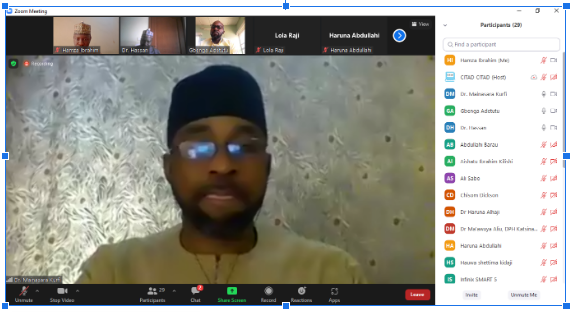
On Tuesday 1st March, 2022 the Centre for Information Technology and Development (CITAD) organized a virtual dialogue to deliberate issues around slow uptake of the COVID19 vaccine. The dialogue which took place via the Zoom platform hosted two public health experts-Dr. Hassan Shuaibu Musa, Principal Medical Officer and Lecturer at Abubakar Tafawa Balewa University, Bauchi and Dr. Ma’awuya Aliu as speakers, Hon. Jafar Mohammed Zuru, Commissioner, Kebbi State Ministry of Health gave a keynote address while Dr. Mainasara Yakubu Kurfi, the Head, Department of Mass Communications, Bayero University Kano served as moderator.
The one hour thirty minutes virtual event titled “Discussing COVID19 Vaccine Uptake Series 2.0” began with goodwill message from Hon. Jafar Muhammed Zuru, Commissioner of Health Kebbi State who was represented by Haruna Abdullahi, Director Immunization and Disease Control in the Ministry, in the message he commended CITAD for organizing the dialogue adding that it is a timely effort as it brought qualified stakeholders to deliberate on the vaccination issue, he urged participants from various states to listen to the speakers with interest and make use of the strategies they will share during the dialogue.
Hindrances and factors responsible for slow uptake of the vaccine, hesitancy or non acceptance of the vaccine shared by the speakers during the dialogue included the following:
It noted was during the dialogue that hesitancy of the vaccine by healthcare workers is heavily and negatively impacting the vaccination exercise, it was also learned that for example in Bauchi state only 11% of the state’s healthcare workers took the vaccine, the concern therefore was how would the public have trust and confidence in the vaccine if healthcare workers are also reluctant to take it? Another issue raised during the dialogue was that many people COVID19 patients are asymptomatic and the public justify their misconception on the virus, for example again in Bauchi state 78% of COVID19 patients were asymptomatic. After intense deliberation on the above areas, questions and comments by the dialogue participants, the speakers recommended the following:
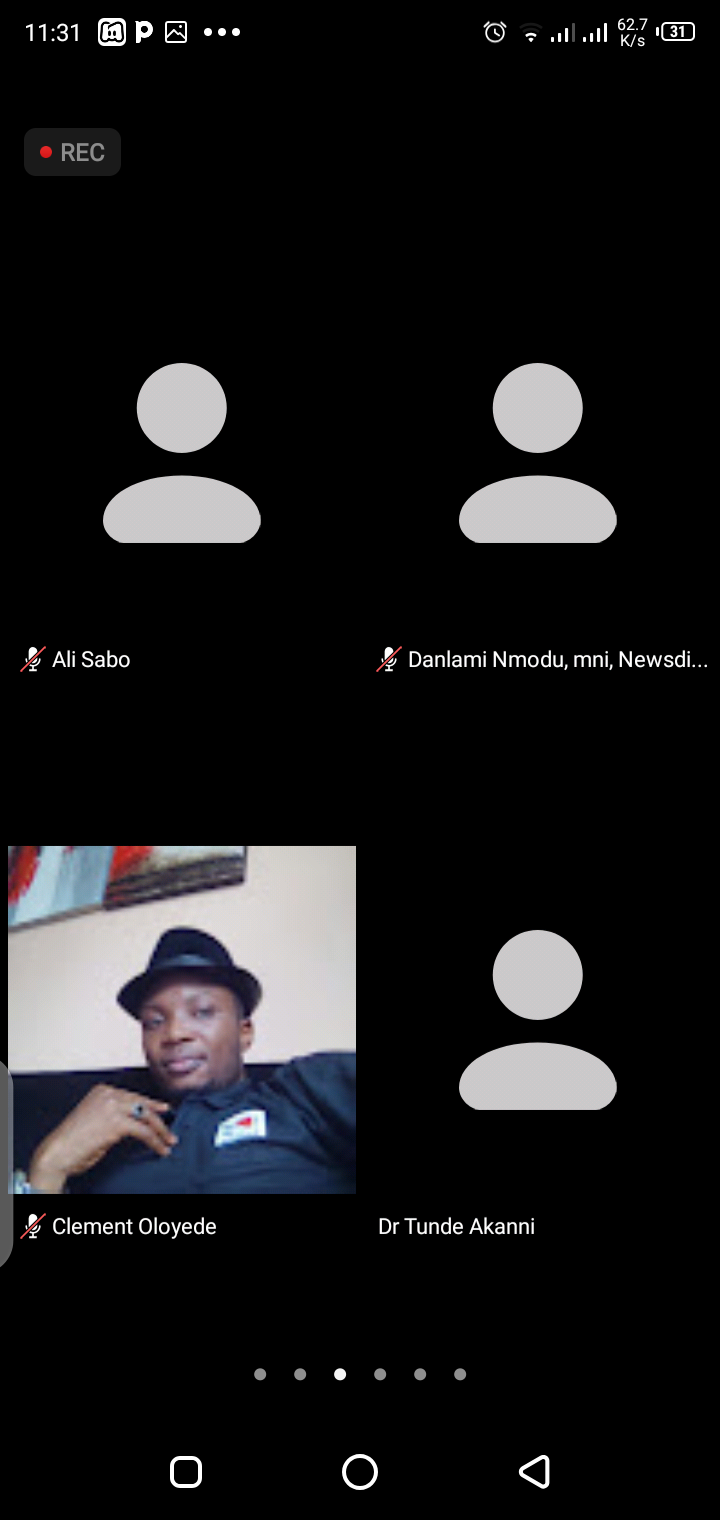
As part of its continued efforts to contribute to the fight against corruption in Nigeria, the
Centre for Information Technology and Development has instituted a monthly dialogue on anti-
corruption fight in the Nigeria where it is inviting its sub-grantees of its project on Mobilizing
and Catalyzing Citizens’ Action for Accountable Election and Governance in Nigeria which is
being supported by MacArthur Foundation. This month dialogue was held on the 15 th of March,
2022 with Bikiya Graham-Douglas, Singer, Actress and Chief Executive Officer, Beeta
productions, Dr. Tunde Akanni, lecturer, Department of Mass Communications, Lagos State
University and Danlami Nmodu, mni, a veteran journalist and publisher, NewsDiary Online
Based in Abuja, while the webinar was moderated by Clement A. Oloyede, Bureau Chief, Daily
Trust Newspaper, Kano
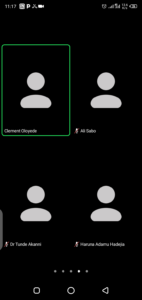
The aim of the dialogue is to give the sub-grantees under this project an opportunity to
regularly share their work with wider audience in promoting accountability and fighting
corruption in Nigeria. The dialogue is also aimed at giving both the sub-grantees and youth who
have interest in the area an opportunity to discuss and share ideas.
In the previous month, the Centre featured Mustapha Bulama of DailyTrust, Mu’azu Alhaji
Modu of Spotlight for Transparency and Accountability Initiative and Joshua Alabi of KINANSO
Concept while Danladi Lawanti of the Department of Mass Communication, Ahmadu Bello
University Zaria chaired the Dialogue. While in the January Dialogue, the dialogue hosted
Abubakar Sadiq Mu’azu, Executive Director, Center for Advocacy, Transparency and
Accountability Initiative and Chioma Agwuegbo, Executive Director, TechHerNG and chaired by
Mukhtar Modibbo of Connected Development.
In his welcome remarks at the dialogue, the Executive Director of the Centre for Information
technology and Development who was represented by the Senior Program Officer, Malam
Haruna Adamu reiterated the Centre’s committed to the fight against corruption in the country.
Malam Adamu said CITAD has for many year been in the forefront in the fight against
corruption and building the capacity of other Civil Society Organizations and Community Based
Organizations in this area. He went further to state that the Centre is also conducting other
activities in order to ensure everyone is part of this fight like training young people on using
social media for accountability and engaging students to report abandoned projects in their
communities which is also part of instituting the culture of holding their representatives
accountable in the country.
Sharing her experience at the dialogue, Miss Bikiya said corruption has been embedded in our
system and it’s the number one enemy that is thwarting the development of the country. She
also stated that abuse of public finance system is on the rise in the country. Discussing about
the remedy to the situation, Miss Graham-Douglas said ensuring accountability starts with one
self. In talking about her activities and how they are creating awareness on the area, she
mentioned that from her part, she is using films to enlighten the general public most especially
women about the need to start demanding for accountability from their representatives.
The second speaker at the dialogue, Dr. Tunde Akanni who is conducting research on the level
of corruption at tertiary institutions shared with the participants that the level of corruption in
tertiary institutions is so high to the extent that lecturers and other non-academic staff are
extorting students seeking for admission into the universities. Mr. Akanni also stated that sex
for admission and marks was also complained by some of the students who participated at the
research conducted. To balance the claims made by some of the interviewed students, Dr.
Tunde said during the first validation of the research with some selected staff of some of the
tertiary institutions, it was disclosed that it is of course true students are going through
different kind of extortion ranging from financial to sexual harassment. Lamenting on the
situation, Dr. Akanni mentioned that the major factor contributing to this menace is lack of
strong laws and punishment that will serve as deterrent to other perpetrators or those that
want commit similar offence. At the end, he called on the school authorities, civil society
organizations, media and other relevant agencies to work assiduously in protecting students
more especially female students in the country.
In his contribution, the last speaker at the discussion, Mallam Danlami Nmodu emphasized on
the need for journalists to adhere to the journalistic ethics and best practices. He lamenting
that many of the journalists nowadays are in the habit of extorting and blackmailing people,
given an example with the publisher of Peoples Gazette who was exposed recently on such act.
He went further to state that as watch dog in the society, media practitioners have to be clean
and up hold the best standard of practice in the their work in order to maintain their respect in
the eye of the public.
The webinar was attended by over 20 participants from across the country.
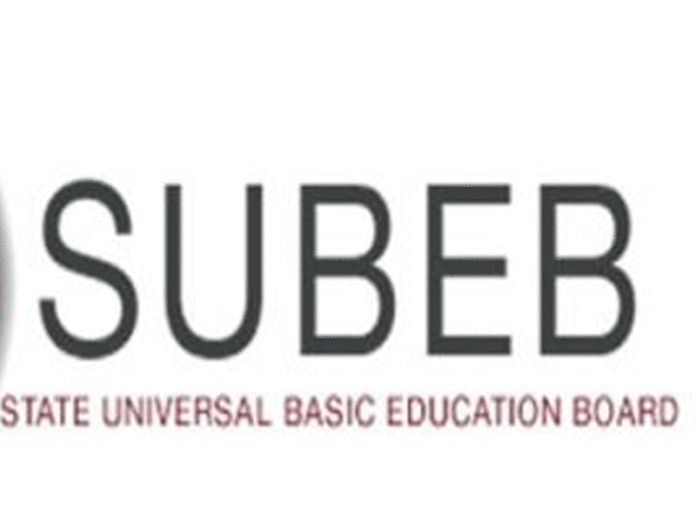
Segun Awofadeji
The Centre for Information Technology and Development (CITAD) has expressed its readiness to collaborate with the Bauchi State Universal Basic Education Board (SUBEB), in procurement, to promote transparency and accountability.
This was disclosed by a Senior Programme Manager of CITAD, Isa Garba, when he led his team on advocacy to SUBEB and his management.
According to him, CITAD trains directors and deputy directors on accountability and transparency in public service.
“We are here today to inform you that CITAD is granted by the United Sates Agency for International Development (USAID) through the ‘State Accountability, Transparency and Effectiveness’ (State2State) to implement a governance project in Bauchi State,” he explained. “The goal of the project is to strengthen citizens’ participation in governance through active participation in the budgetary and procurement processes of the state.”
According to him, the project’s objectives include enhancing the capacity of 40 CSOs to engage both government and citizens in the budget process to improve citizens’ participation in budget processes and the skills of 40 government officials, among others.
He added that in the implementation process, CITAD would work with SUBEB and engage legislators in increasing the budgetary allocation to the education sector and help the agency in monitoring projects.
In his response, Permanent Commissioner, Alhaji Idris Hardawa, said, “Our books are always open for you to go through, and we are ready to work with you in achieving a transparent procurement atmosphere. We are partners with you in the development of the basic education sector.”
He added, “Everything we do here is open and transparent in line with financial and procurement regulations. We ensure that due process is followed in procurement transactions.”
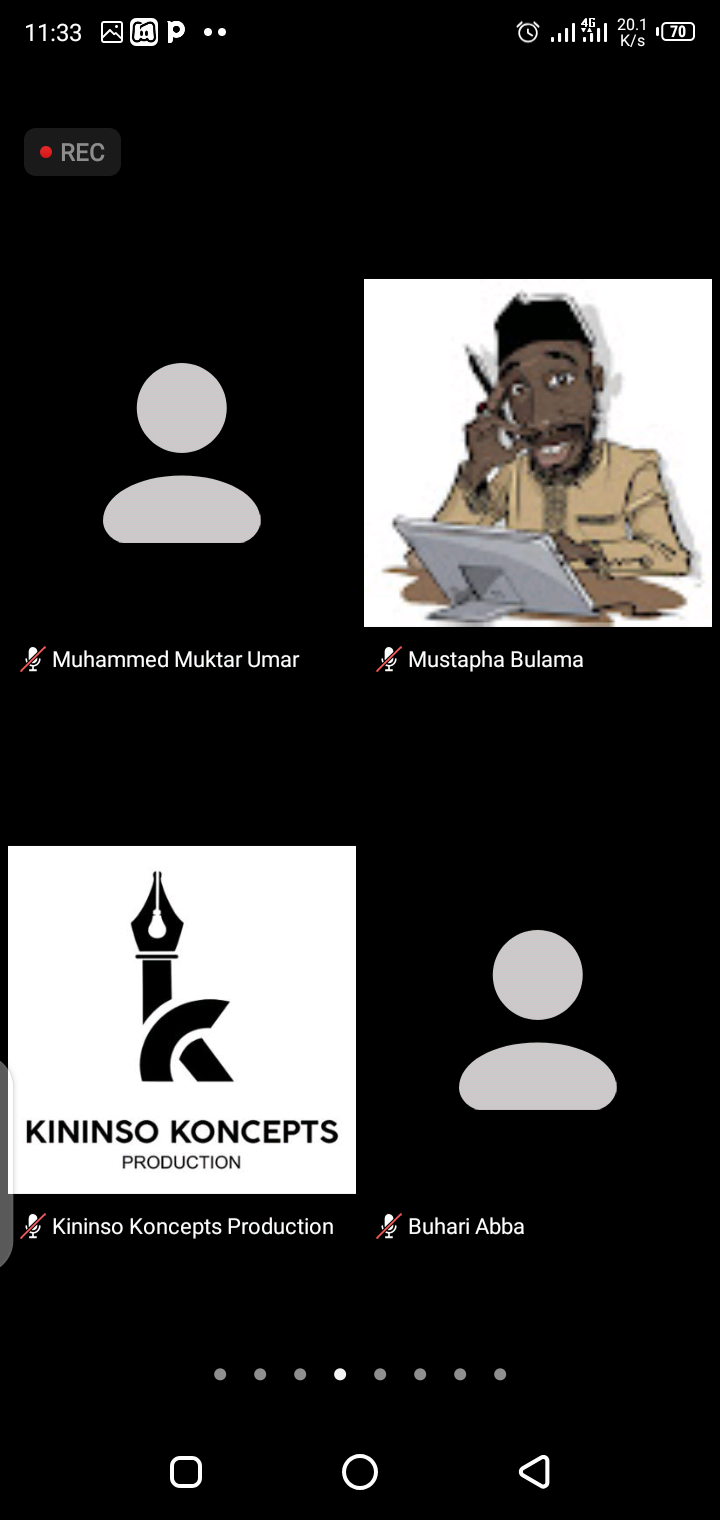
The Centre for Information Technology and Development had on 10 th of February, 2022 under
its project on Mobilizing and Catalyzing Citizens Action for Accountable Election and
Governance in Nigeria supported by MacArthur Foundation held its Second Dialogue on Anti-
Corruption Fight in Nigeria with three of its sub-grantees; Mu’azu Alhaji Modu, Executive
Director, Spotlight for Transparency and Accountability, Mustapha Bulama, Editorial Cartoonist
with Daily Trust and Joshua Alabi, Executive Director, KININSO KONCEPTS and moderated by
Kabiru Danladi, Lecturer with Department of Mass Communications, Ahmadu Bello University
Zaria. In the previous edition, CITAD hosted Abubakar Sadiq Mu’azu, Executive Director, Center
for Advocacy, Transparency and Accountability Initiative, Jide Ojo, Independent Researcher,
Writer, Public Affairs Analyst and Journalist and Chioma Agwuegbo, Executive Director,
TechHerNG, the session was chaired by Mukhtar Modibbo of Connected Development.
The aim of the dialogue is to give the sub-grantees under this project an opportunity to
regularly share their work with a wider audience in promoting accountability and fighting
corruption in Nigeria. The dialogue is also aimed at giving both the sub-grantees and young
people who have interest in the area an opportunity to discuss and share ideas.
Giving his remarks at the dialogue, the Executive Director of CITAD, Malam Yunusa Zakari Ya’u
who was represented by the Centre’s Communications Officer, Malam Ali Sabo said CITAD has
for many years been working in the area of accountability and fighting corruption in Nigeria and
empowering young people to demand for good governance in Nigeria. He further stated that,
the essence of organizing the monthly dialogue is to create a platform for the sub-grantees and
those who have an interest in the area to discuss ideas and learn from each other. “Corruption
and lack of accountability are the major obstacles towards the country’s growth and
development”. He stated. At the end, Malam Ya’u said, for citizens to effectively fight
corruption “we need one another, we need to collaborate with others working in area and
share our ideas.”
Sharing his experience on the different tools and mediums he uses in demanding for
accountability and fighting corruption, Mu’azu Alhaji Modu said in Yobe State his organization
selected 30 young people from 30 communities in six local governments in the state and
trained them on how to track Basic Health Care Funds. Also Mr. Modu said part of what they
are doing are advocacy visits to respective government agencies such as Yobe Primary
HealthCare Development Agency, Yobe State Contributory HealthCare Management Agency to
ensure what are being budgeted have reach the common people. Moreover, to ensure a robust
conversation between governments and citizens, Mr. Modu said they provided a platform
where citizens and government officials discuss issues affecting their communities.
Another panelist on the discussion, Mustapha Bulama of DailyTrust said there are many
informal ways that messages especially on anti-corruption could be sent to public, some of
these are through cartoons, illustrations and animations. Bulama said people find it hard to
read long articles on the internet, but when issues of corruption and fraud are simplified
through cartoons, people tend to understand it and appreciate it more. Bulama also said
creating awareness among people and reorientation especially on anti-corruption fight is very
important. The speaker also mentioned that using cartoons to display the negative affect of
vote buying is another way to sensitize the public about the importance of voting of competent
leaders in the country. At the end he mentioned that social media such Twitter, Facebook and
Instagram are some of the best platforms to reach young people and send messages to
government officials.
The last speaker, Joshua Alabi of KININSO KONCEPTS also discussed on the platforms he uses in
creating awareness on anti-corruption, accountability and electoral processes. Joshua said using
art and theatre for storytelling not in the way of entertainment but in changing the narrative of
the governance in the country is very important. Mr. Alabi said, as part of their efforts to
create awareness in the area of accountability and good governance they are transforming
stories into educative films around accountability and good governance. He further said,
collaboration with other stakeholders in the area such Nollywood Actors/Actress, Young people
and social media influencers is another way they are using to educate the public.
At the end participants asked questions and made comments.
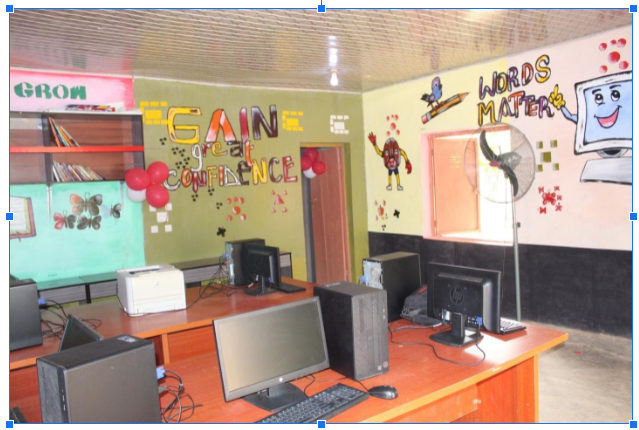
Centre for Information Technology and Development and Library Aid Africa, with support from Action Aid launched an ICT centre and library in Pasepa community, Bwari Area council, FCT. The launch took place on Thursday 3rd February, 2022; the team paid a condolence visit to the palace in solidarity for dead of their community king.
The launch started with an introduction of staffs, members of the high table and community members. A welcome address was given by CITAD programme officer Yesmin Salako who appreciated and welcomed everyone to the launch of the library and ICT centre, she applauded the community members who took charge of the project and saw to the library set up being a reality, stating that all the vendors (carpenter, electrician, and artist) all came from the community, indicating that there is ownership of the project by the community. There was a goodwill message from Dr. Oluchi Iche Kalu from National Library of Nigeria (NLN), who commended the efforts of CITAD, AAN and LAA on setting up a library at a rural community, she explained that it is one of the goal of the National Library is to see that the art of reading is taken place at the grass root level. The president of Women Entrepreneurs Development Forum (WEDF); Hajiya Halima Zubairu Dambatta also delivered a good will message, the organization spoke on most of its humanitarian activities in the community, and were excited to see more projects going in the community, WEDF also promised to impact the community positively while working together with every development partner working to see to the development of the community.
Action Aid Director of programmes; Hajiya Suwaiba Muhammad Dankabo, delivered a lecture on Action Aid perspective of development. While delivering her lecture she said “The objective of the program is enhancing technological skills as well as breaking barriers to digital development. We want to see a situation whereby everyone in Nigeria has digital access and are able to connect to the world, irrespective of their location, sex, gender and status”. She further explained that the organization is partnering CITAD which is providing technical support for successful implementation of the project. CITAD was able to work with the community after our mobilization making sure people provide the space. In partnership, we brought in the technical equipment while CITAD is bringing in the technical support in terms of expertise and digital literacy and then we connected these people to a forum in New York where they see what is happening in the world and then they see how young people are mobilizing and then they are able to take their issues in the community and engage with their duty bearers. And then they are also engaging in digital campaigning”.
The launch proceeded with a speech from the Community leader Alhaji Mohammed Pasepa who gave a community brief, involvement in the project and sustainability plans. Mohammed Pasepa said that the ICT centre which was established by CITAD has led to many development in the community as they plan to convert the centre to a school where people pay to learn how to operate the computer. He said the community members use the centre to apply for jobs, they print community works and also students planning to write JAMB can practice with the computers before proceeding to write the exam. He appreciated the set-up of the library while involving the community in the construction purpose, he also added that other students or children from neighbouring communities will benefit from the library.
To officially launch the library and ICT centre CITAD, AAN directors, representatives of the National Library, President WEDF, community leader and the children from the community proceeded for a ribbon cutting. Group photographs were taken, refreshments were served and gifts were received from AAN and WEDF by the community librarian Abubakar Ibraheem.
The program came to an end with a vote of thanks delivered by CITAD assistant programmes officer Mubarak Ekute, he thanked everyone for gracing the event and making the day a memorable one.
The media links are; https://www.blueprint.ng/citad-aan-launch-ict-centre-library-in-pasepa-community/ https://humanitywatch.ng/874-2/